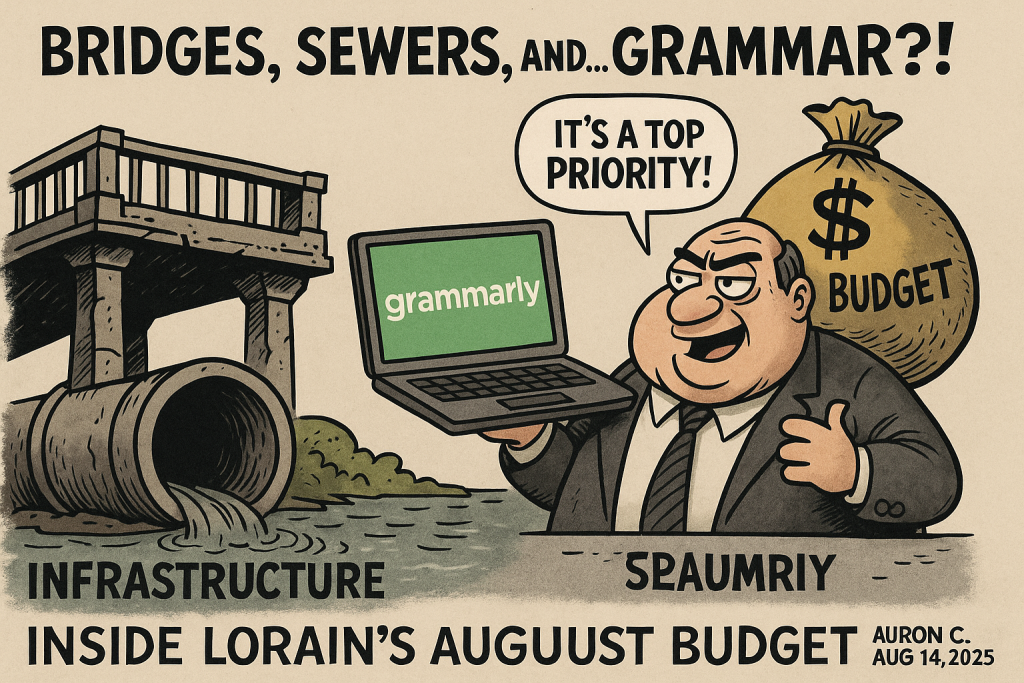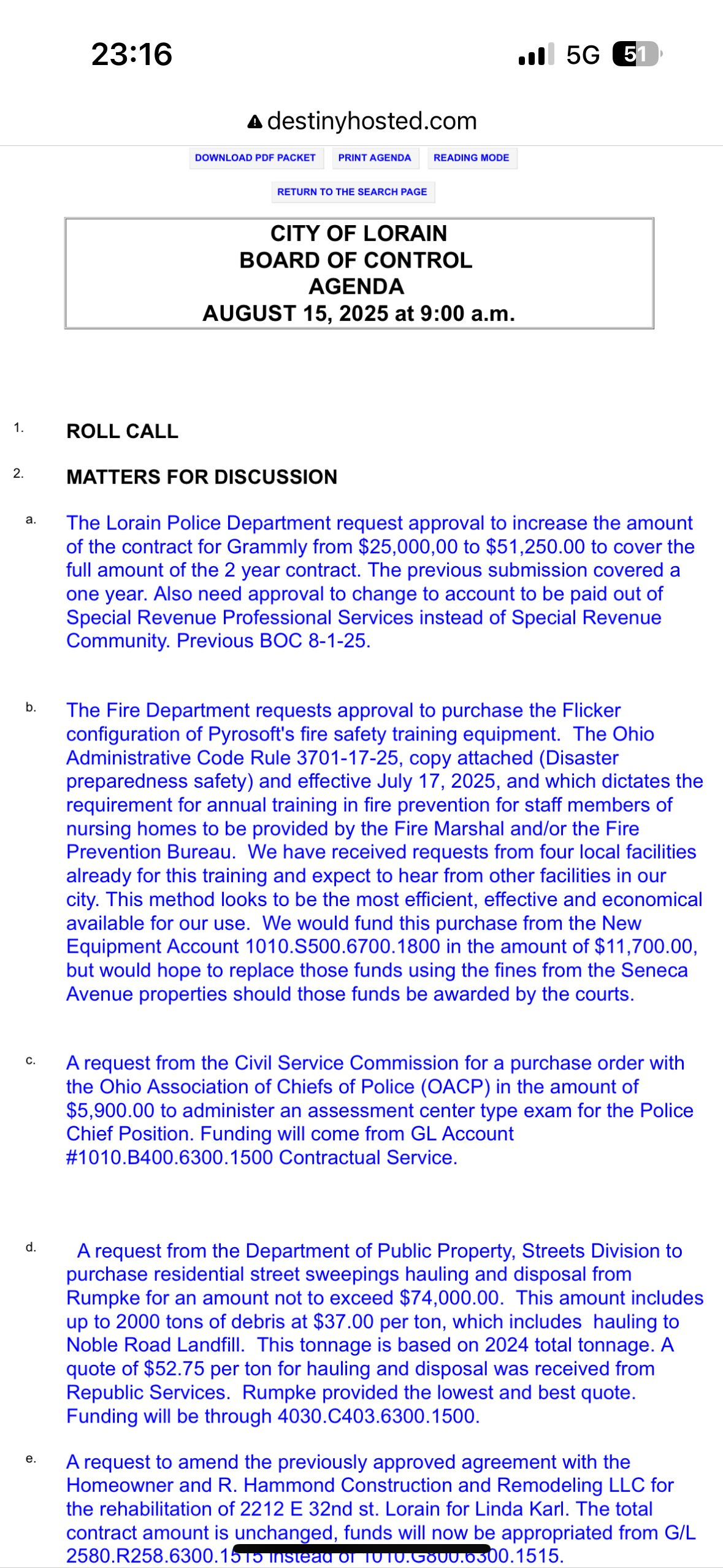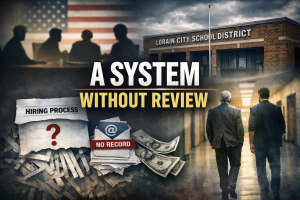Bridges, Sewers, and… Grammar? Inside Lorain’s August Budget

Aug 14, 2025
By Aaron Knapp Lorain City Politics Unplugged
Understanding the Board of Control Meeting
Before city spending requests reach Lorain’s City Council for final approval, they are first reviewed by the Board of Control—a group of city administrators tasked with vetting contracts and expenditures.
The Board’s role is to provide an initial level of oversight and manage spending requests to ensure they align with city needs and budget realities. However, it’s important to clarify that the Board of Control does not have the authority to approve the city budget itself—that remains with City Council.

The Board’s approvals serve as recommendations or preliminary clearances that streamline decision-making later on. The August 15 Board of Control meeting will consider a range of contracts and spending increases, some of which reflect necessary infrastructure and regulatory compliance, and others which raise questions about fiscal priorities amid the city’s ongoing budget challenges.
Infrastructure Investments: Bridges and Sewers
Two of the largest contracts under consideration relate to critical infrastructure projects vital for public safety and city operations.
Bridge Inspections and Rehabilitation Planning: The Engineering Department plans to contract Richland Engineering for $11,000 to inspect 10 city bridges and an additional $12,529 for preparing plans and grant applications related to rehabilitating the Sherwood Bridge. Maintaining bridges is not only essential for public safety but also required to comply with state and federal regulations, which increasingly tie funding to rigorous inspection and maintenance standards.
Jaeger Road Pump Station Rehabilitation: Perhaps the most significant expenditure is a contract with North Bay Construction, capped at $9.9 million, to rehabilitate the Jaeger Road Pump Station. This is funded through the Water Pollution Control Loan Fund (WPCLF) and may include up to $12 million in long-term debt. The pump station is a key part of the city’s sewer infrastructure, and failure to maintain it could lead to costly emergency repairs or environmental violations. This project represents a major but necessary investment in Lorain’s aging infrastructure to ensure reliable wastewater management and compliance with environmental standards.
Asset Management Software: A Quiet $250,000 Increase
The Utilities Department is requesting a $250,000 increase to its existing $300,000 contract with Stantec Consulting Services for the Cityworks asset management system, bringing the total contract value to $550,000. Cityworks is designed to help track, manage, and optimize city assets like water lines, sewer systems, and equipment.
While such software can lead to better long-term cost savings and operational efficiencies, the sharp increase in contract value—more than doubling the original amount—raises concerns about project scope creep, contract management, and budgeting practices. Given Lorain’s tight financial situation, large contract amendments warrant transparency about what additional services or features are being purchased, the reasons for cost overruns, and the expected benefits to residents. Without this clarity, it’s difficult for the public and decision-makers to assess whether the additional expense is justified.
Grammarly Contract: Doubling Down Amid Budget Crisis
One of the more unexpected budget requests is for the Police Department to increase its Grammarly contract from an original ask of $25,000 to $51,250 for a two-year subscription.
Grammarly is a widely-used AI-powered writing assistant that helps improve grammar and clarity. However, its use by law enforcement raises serious concerns around data privacy and security. Many police agencies nationwide have moved away from cloud-based writing tools due to risks of exposing sensitive or confidential information, which could compromise investigations or violate legal protocols.
Lorain’s doubling of this contract—after the original $25,000 request was not approved—comes at a time when the city is widely regarded as being in budget crisis mode, struggling with limited resources for critical services.
This expenditure not only strains scarce funds but also demands a thorough explanation: was the initial request denied?
How does Grammarly comply with law enforcement data security standards?
Were safer or more cost-effective alternatives evaluated?
Residents deserve clear answers before approving a large, cloud-based software contract for police use amid ongoing fiscal constraints.
Other Budget Requests of Note — Necessary Investments Amid Tight Budgets
The agenda also includes several smaller, but important, spending requests that reflect the city’s efforts to meet regulatory requirements and maintain essential services.
Fire Department Training Equipment ($11,700): The Fire Department seeks to purchase Pyrosoft’s Flicker fire safety training equipment. This purchase supports compliance with a new Ohio Administrative Code rule mandating annual fire prevention training for nursing home staff starting July 2025. Since several local facilities have already requested this training, investing in in-house equipment is a proactive, efficient, and cost-effective way to deliver these mandated programs and enhance public safety.
Civil Service Police Chief Exam ($5,900): Funding is requested for an assessment center-style exam administered by the Ohio Association of Chiefs of Police to ensure a professional, thorough, and fair selection process for the Police Chief position. Given the importance of leadership in law enforcement, this expense is justified.
Street Sweepings Hauling and Disposal (up to $74,000): The Department of Public Property plans to contract Rumpke to haul and dispose of up to 2,000 tons of residential street sweepings. Maintaining clean streets contributes to environmental quality and public health, and this contract reflects a competitive bidding process.
Homeowner Rehabilitation Contract Amendment: A funding source amendment (not an increase) is requested for a contract rehabilitating a home at 2212 E 32nd Street. Supporting home repairs helps improve neighborhood conditions and property values. These items illustrate that while some requests may seem questionable, many are necessary to keep the city operating smoothly and meeting legal and community obligations.
Lorain’s Budget in Crisis Mode
It’s important to frame these requests within the larger reality that Lorain’s city government is currently operating under significant budget pressures. Revenues have been tight, costs are rising, and the city is grappling with balancing competing priorities. Requests like the doubling of the Grammarly contract and the $250,000 increase in asset management software costs stand out against this backdrop. They highlight the challenge of managing scarce resources while investing in tools and services intended to improve operations. While infrastructure projects and regulatory compliance expenses are critical and generally unavoidable, discretionary spending on software or subscriptions demands heightened scrutiny. The city must be transparent about how these decisions fit into long-term financial stability and whether alternatives have been fully explored.
Final Thought: When Priorities Compete, Transparency Matters
The August 15 Board of Control meeting will set the tone for Lorain’s budget priorities moving forward. While many expenditures are justified by safety, regulatory, or operational needs, others raise questions that must be answered openly. Budget decisions are a reflection of community values and priorities. With limited resources, every dollar spent has an opportunity cost, meaning funding one project could delay or prevent investment in another more critical area. In this environment, transparency and accountability become not just good governance but essential tools to maintain public trust.
The doubling of costs on items like the Grammarly contract and the asset management software increase demand clear justification from city officials: How do these expenses directly benefit residents?
What safeguards protect sensitive information?
Were other options considered and why were they rejected?
Residents deserve these answers to understand how their tax dollars are being prioritized, especially when the city faces a budget crisis. The Board of Control plays a key role in vetting these spending decisions, but the final accountability lies with the City Council and, ultimately, with the public. As Lorain navigates these fiscal challenges, transparent communication and prudent budgeting will be critical to sustaining essential services and rebuilding trust in local government.






